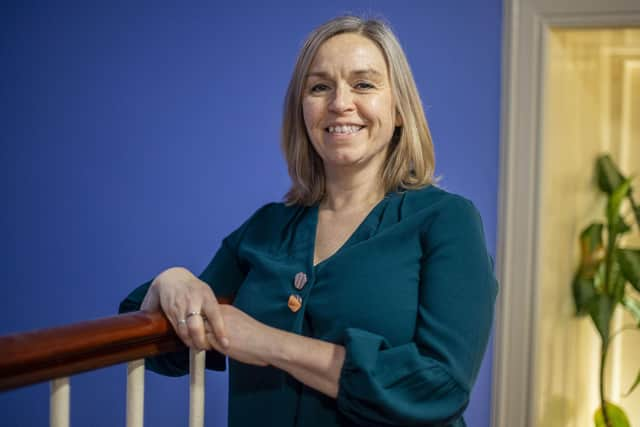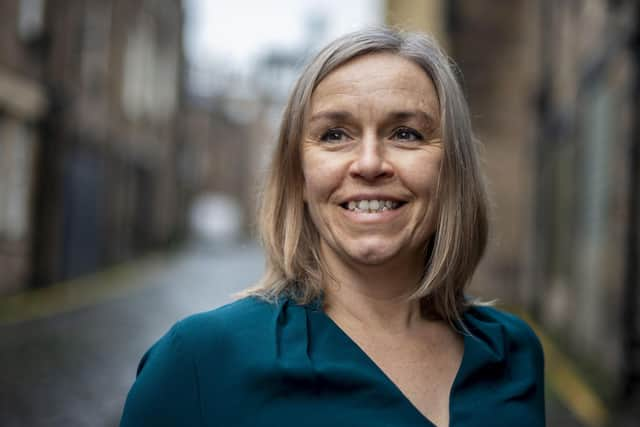Interview: Alex Lusty of Equity Gap on how the syndicate is turbocharging ambitious firms
Specifically, she says it’s where a young firm has fundraising ambitions, and the investor community is “supportive and motivated and come together to help the company achieve their target raise”. The businesswoman acknowledges that this is the syndicate’s bread and butter – but “there is a huge amount of work that goes on behind the scenes… so it's really satisfying when a deal completes, and the company then is funded, and the investors get their share certificates”.
The Edinburgh-based organisation was founded in 2010 by Scottish rugby international turned business leader Jock Millican, aiming to help match investors with entrepreneurs looking for early-stage business funding.
Advertisement
Hide AdAdvertisement
Hide AdTaking a “sector-agnostic” approach, it says investee companies have created more than 600 jobs, primarily in Scotland, and its portfolio currently contains 30-plus firms in industries including food and drink, life sciences, and tech including eco-friendly cleantech. Its investor members typically plough sums of about £100,000 to £500,000 into ordinary shares at initial or seed investment stage, and it can beef these up with the help of parties including Scottish Enterprise, the Scottish National Investment Bank, the University of Edinburgh's venture investment fund Old College Capital, Aberdeen-based investment syndicate Alba Equity, and BGF (formerly known as the Business Growth Fund).


Lusty has been with Equity Gap since 2019, now holding the title of head of operations and compliance. She joined after a 25-year career in banking including 18 years at Royal Bank of Scotland where she learnt about investment, and progressing to senior operational level.
After taking redundancy from the NatWest-owned bank, her husband Fraser, who was a director at Equity Gap, said he and Millican, who is now the syndicate’s chair, lacked capacity in external-facing work as they were developing its internal business and operations.
“I said, ‘yeah, I'll do a little bit with you until I find an alternative role’,” but saw demand for her know-how gain momentum, she says now. “And I've been leading on operations, strategic projects, and then moving more into deal and relationship activity over the last few years.” She is also senior at Angel Capital Scotland, helping it develop a Scottish Government-backed deal-sharing platform, and the industry body (an operating brand of Linc Scotland) says Scotland’s angel syndicates support around 2,000 active business angels, who help leverage at least £75 million into early-stage scale-up companies each year.
Equity Gap in June announced changes to its top team, including naming Fraser MD, as it looked to “attract significant new investors to Scotland”, and having realised Millican’s vision to create the sixth most active group of its kind in the UK. “We’re happy right now with our team size and capability,” says Lusty.


That came after it in January said it had enjoyed another record year in 2022, with total investments to date into portfolio companies reaching £200m. Last year saw its members invest more than £7m across 30 funding rounds, leveraging total funding of £70m.
Its exits to date include catering firm Spoonfed, while businesses on its books at present encompass tech specialist Amiqus and philanthropic beer company Brewgooder, wave pioneer Mocean, and healthtech-focused PneumoWave.
Lusty stresses that she and Equity Gap are keen to foster female entrepreneurs, citing “concerning” statistics showing that overall they tend to raise less funding than their male peers, for example. However, Lusty says Equity Gap (now in its third year of being signed up to the UK’s Investing in Women Code) has worked with 75 female investors, and it will by the end of this year have invested in 15 women-led companies, in which its investors have invested nearly £7m, with these firms having collectively raised £43m.
Advertisement
Hide AdAdvertisement
Hide AdShe also states: “What I’ve been keen to do is help us as an organisation recognise what was already in place to support female-led businesses, and female investors, and give a bit more of a lens and a spotlight onto that activity. Equity Gap has always had a vision of being inclusive and accessible, and it was very much set up as a member-led organisation, so designed to help bring people together to collaborate.”
One of its current investments is veterinary diagnostics firm Mi:RNA, which is headed by Dr Eve Hanks and won the Business to Watch award at the recent Women’s Enterprise Scotland Awards 2023. Also among the ranks of Equity Gap’s female-led portfolio firms, as of 2014, is online booking specialist Appointedd. Founder and chief executive Leah Hutcheon said: “Pitching to Equity Gap’s mix of male and female investors has always felt friendly, and we really appreciate the help and support we get from being able to collaborate with such a diverse portfolio of companies.”
In response, Lusty says: "That's kind of the crux of it. Because the investors are investing their own money, they want to get to know the founder, get to know the business, and make a confident decision that they feel that that is an organisation – and an individual or team – that they can work with and support.”
Equity Gap, which is now authorised and regulated by the Financial Conduct Authority, aims to bring in at least three or four new companies into the portfolio each year (with purpose-led firms having gained increasing traction) and help existing companies evolve to be exit-ready. The syndicate’s investor base stretches as far away as Australia, and the organisation is “always open” to taking on more, especially from under-represented groups.
Lusty, who has made three investments herself through Equity Gap, notes choppy market conditions this year widening the gap for companies accessing finance. “The more people that we have active within our investor base, the more companies that we can support – either as new investments or helping our existing portfolio companies develop and grow.”
Comments
Want to join the conversation? Please or to comment on this article.